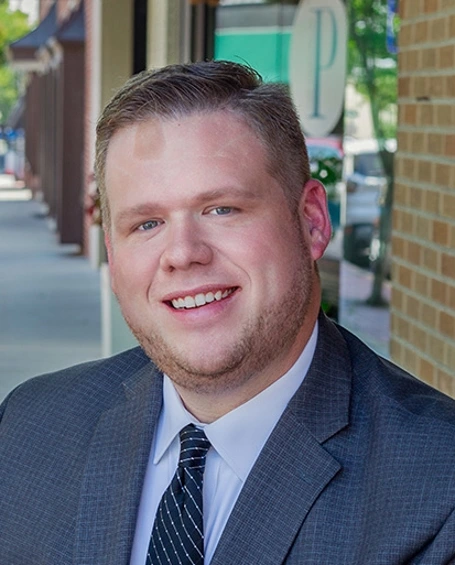Choose Wisely and Protect Yourself When Naming a Power of Attorney
Benjamin E. Long
Attorney at Law – Expert in Estate Planning and Power of Attorney
At Schlagel Long, LLC, we understand the gravity of appointing a Power of Attorney (POA). As the Founding Attorney specializing in Estate Planning and Probate Law, I, Benjamin E. Long, emphasize the importance of careful selection and the responsible use of POAs in estate planning.
Bridging Legal Expertise with Personalized Guidance:
In light of the critical advice from our latest blog post, "Choose Wisely and Protect Yourself When Naming a Power of Attorney," I bring a nuanced approach to advising clients on selecting a POA. My background in probate, property, and business matters, combined with a deep understanding of family dynamics, positions me uniquely to guide you in this sensitive area.
Tailored Power of Attorney Strategies:
Recognizing that each individual’s situation is unique, I offer personalized strategies that resonate with our blog's core messages. Whether it's assessing the suitability of a potential POA through the "checkbook test" or deliberating between single or multiple agents, my approach is always tailored to your specific needs and circumstances.
Comprehensive Legal Solutions:
Beyond just naming a POA, my expertise extends to creating comprehensive estate plans that include contingencies for changing agents if necessary, and differentiating between Financial and Healthcare Powers of Attorney. My experience with various legal tools ensures that your estate planning is robust, flexible, and aligned with your values and goals.
Educational Background and Professional Recognition:
Holding a J.D. from Washburn University School of Law and a B.S. in Biology from Kansas State University, I bring a combination of legal acumen and analytical skills to the table. My recognition as a Super Lawyer Rising Star and the Martindale-Hubbell Client distinction award underline my commitment to excellence in estate planning and litigation.
Dedication to Community and Education:
When not practicing law, I contribute to the community by teaching at Washburn Law School and coaching the Kansas State University Mock Trial Team. These roles allow me to stay at the forefront of legal education and advocacy, ensuring that my clients benefit from the most current and effective estate planning strategies.
Your Partner in Planning:
At Schlagel Long, LLC, my goal is to empower you with clear information and choices about how we can protect you and your loved ones. With a focus on your story and values, I am dedicated to crafting estate plans that not only protect your financial wealth but also reflect your intellectual and spiritual legacy.
For a consultation on Power of Attorney and estate planning tailored to your unique situation, reach out to Benjamin E. Long at Schlagel Long, LLC, Olathe, KS

Tips for Selecting and Appointing a Power of Attorney
“Children may have moved away or lost touch. Old contacts may have died or become disabled. You cannot trust everyone and criminal cases based on misuse of a power of attorney do exist.”
Deciding who to name as your power of attorney, or “agent” is not an easy decision. However, it is a necessary appointment, says the article “Ways to protect yourself when appointing a power of attorney” from The Mercury. Disaster and disability strike without advance notice, so it’s important to make this decision while you are well and can think it through.
If you don’t have a power of attorney in place and the unexpected occurs, the only way for your family to obtain legal authority to act on your behalf is through a guardianship procedure. Even when not contested, guardianship is expensive, time-consuming, and can limit personal freedom. Not every court will award guardianship to a family member, so the end result could be a stranger taking control of your decisions and property.
Having a power of attorney is a far better alternative, but there are seniors who are concerned about the power of a POA and how it might be abused.
Here are some tips to keep you in control of your life even with a POA:
Choose Your Agent Wisely
Choose wisely when you are well. Choose your agent when you are of sound mind and body. A common “test” is the checkbook test: could you, right now, hand this person your checkbook without a second thought? Do you believe this person would act responsibly, in your own best interest, follow through in paying bills, ask for help in areas they may not understand, record transactions, and be scrupulously honest? If you hesitate to give them your checkbook today, you aren’t likely to trust them to run your life in the future.
Many people choose an agent based on whether the person is the oldest child or if there would be hurt feelings if the person was named. These are not good reasons. A person who has problems managing money, for whatever reason, is not a good candidate. Their own stress might make access to your funds too great to resist.
Name a Secondary Power Of Attorney
Customize Your Power of Attorney to Your Personal Needs
Consider Whether to Name One or Two Agents
Two agents or one agent? Not all banks or investment companies will accept two agents. If they do, will the two people you select be able to work together? If not, naming two could create a financial and legal firestorm.
Consider Separating Financial and Healthcare Powers Of Attorney
Know That You Can Remove Your Agent at Any Time
Fire when necessary. You always have the right to remove someone from their role as your agent. Your attorney will know how to do this properly to protect you and other agents.
Related Posts
Choose Wisely and Protect Yourself When Naming a Power of Attorney
Protect Assets From Medicaid Recovery
Why Do You Need a Health Care Directive?
Don’t Overlook Key Parts of Estate Plan
Your Estate Plan Needs To Be Customized
Still Procrastinating About Your Estate Plan?
Why You Need an Advance Directive Right Now
Your Children Wish You Had an Estate Plan
